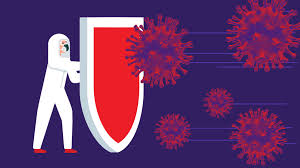| Have these 6 changes come to you? I won't offer advice (that's a turn-off), but the 6 things and knowledge about them should make you want to change! |
But do people drink more during the pandemic?
The World Health Organization (WHO) and the National Institute on Alcohol Abuse and Alcoholism (NIAAA) have issued warnings to people to avoid excessive drinking, saying it may increase COVID-19 severity and even susceptibility.
Yale Medicine's website that for the week ending May 2, total alcohol sales in the U.S. were increased by more than 32% (probably more now) compared to the same week a year ago.
When asked about any positive effects alcohol has in the pandemic, David Fiellin, MD, director of the Yale Program in Addiction Medicine, says a definite no.
"In general, because we know that alcohol has a negative impact on the lungs and the immune system, we believe it will be associated with more severe cases of COVID-19 disease,” Dr. Fiellin says. “Alcohol can damage the intestinal lining, which then allows bacteria to enter the body more easily. That can ‘rev up’ the inflammatory response, which is also a big part of COVID-19 disease.”
"In general, because we know that alcohol has a negative impact on the lungs and the immune system, we believe it will be associated with more severe cases of COVID-19 disease,” Dr. Fiellin says. “Alcohol can damage the intestinal lining, which then allows bacteria to enter the body more easily. That can ‘rev up’ the inflammatory response, which is also a big part of COVID-19 disease.”
There's that. Thus, SARS-CoV-2 virus particles could have easier access to the lungs if those cells aren’t working properly,
2. EATING MORE COMFORT FOODS
Aah, "high everything" comfort foods. They are emotionally soothing, but we tend to eat more of them in stress situations. They make us feel good that improves mood and well being.
But sugar and carbs slow down the immune system, and these comfort foods lead to a combination where the brain says "gimme more" to crave during periods of stress. Now that you know, you're able to act and maybe resist.
The Wall Street Journal website says, "Many shoppers have favored fresh and specialty brands over Big Food’s processed products in recent years, while others have opted for cheaper store brands. Now, the world’s largest makers of packaged foods say frozen pizza, pasta sauce, and mac and cheese are rising in favor as consumers in lockdown eat at home."
3. SOCIAL MEDIA BENDERS
Social media can be a welcome distraction if it's not about the rise in COVID. If it comes to a point where social media becomes addictive (like picking up your phone first before really, really having to pee), you need to change your course.
Social media can be a welcome distraction if it's not about the rise in COVID. If it comes to a point where social media becomes addictive (like picking up your phone first before really, really having to pee), you need to change your course.
It's bad for your mental health, and blue light exposure emitted by your phone can disrupt sleep patterns and lower your immune function.
4. NOT EXERCISING
By now, close to 8 months later, the pandemic may ravish your energy and motivation. Moving around and physical exercise, in your own safe home can do wonders.
The idea is increase your heart rate, and this in turn will increase blood flow to your brain and muscles.
You can do this--moving around and exercise--even while you're standing at the sink washing dishes. March in place, or move side to side, or squat lightly. Exercise doesn't have to be hard. It just needs to be consistent and added. Put on some music to get you going.
5. TOTAL STRUCTURE OF YOUR LIFE IS UPENDED
Staying at home was novel for most people in the first few weeks, but eight months? You probably want to go back to work or find another job. Either way, for millions of Americans, by now, this state of things probably makes you feel useless and off track now that you're unemployed or cut back in hours.
Sleeping less, skipping meals or overeating, forgetting to take medicines or supplements, seeing no plan for living or living well? There's no better time to see your personal care physician (PCP) and get help.
6. A POST-PANDEMIC MINDSET
We're all seeking something that will get our heads on straight, but for each person, it's different. What works for some may not apply to you. And you may disappoint yourself if you compare what you did to your pre-COVID standards. The best you can do is aim for less or more everyday. Less (or no) alcohol, comfort foods, and social media, more exercise, to make you able to do the best for yourself.
Remember, if you mess up one day, start the next day. We all--everyone of us--fuck up sometimes. Humans are like that. And by the way? The pandemic slowed down, but it's not over!






















